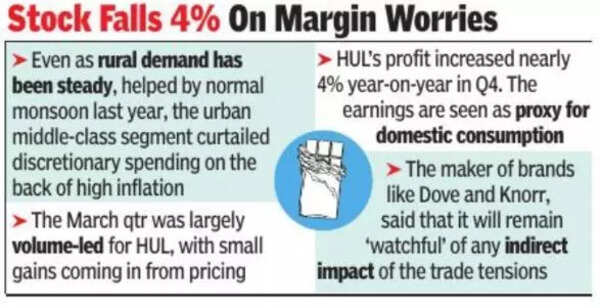Projections of a normal monsoon, tax relief, benefits of which will start to kick in from this financial year, a drop in food inflation, softer crude and lower interest rates will translate into more disposable incomes, boding well for both rural and urban consumption, CEO & MD Rohit Jawa said, shrugging off any direct impact of the ongoing global tariff war on the firm’s business.
HUL reported a marginal 2% year-on-year growth in total sales to Rs 15,000 crore in the March quarter on a standalone basis amid tepid demand in urban markets, which account for a bigger share of its business, while net profits increased by nearly 4% year-on-year to Rs 2,493 crore.

“Macro factors are now turning to be in favour of consumption. This is a really good moment for the CPG (consumer packaged goods) industry,” Jawa said in a post-results briefing, adding that the first half of FY26 is expected to be better than the second half of FY25.
The stock price of HUL ended at Rs 2,325 apiece on the BSE, down 4% which analysts attributed to margin worries; HUL is factoring in a 22-23% Ebitda margin; earlier the stance used to be 23-24%, Nuvama Institutional Equities said. Revenue from operations grew by 2.4% year-on-year to Rs 15,214 crore in Q4FY25. HUL’s earnings are seen as a proxy for domestic consumption.
The maker of brands like Dove and Knorr, however, sa id that it will remain “watchful” of any indirect impact of the global trade tensions. “We are generally very insulated as a company. We are a local for local business, and supply chains are reasonably resilient. If the overall (Indian) economy gets impacted, as it might by some degree, then we will also be a part of the same platform,” Jawa said.
Even as rural demand has been steady, the urban middle-class curtailed spending on the back of high inflation over the past few quarters, weighing on the growth of the industry.











